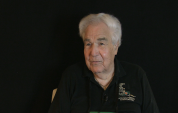2:43 | Jim Bolan was attached to the Marines for a while as a sniper. He used an M-1 for the closer stuff but for anything really distant, he used his own rifle that his father had sent to him. Then a general got a look at it. Son, that's an illegal weapon.
Keywords : James R Jim Bolan Korea Intelligence and Reconnaissance (I&R) sniper M-1

Jim Bolan's father was a tool and die man who was so good, he quit several jobs during the Depression. The younger Bolan was allowed a great deal of independence and enjoyed a summer job on a farm and living with a rich aunt on the Jersey shore.
He was a good football player, having played semi-pro while still in high school. JIm Bolan didn't stop there, he played once he was in the Army and went to the 82nd Airborne to do just that. Someone else got that slot, though, so he went to Korea, where it was bunker battles on static lines.
Two interesting things happened to Jim Bolan in Korea. One night, after his shift in the command post ended, he was walking on a slippery steep hill when he lost his footing and down he went. What happened then was memorable. The other thing involved the failure to capture a Chinese soldier after two weeks of trying. He and his buddy decided to give it a try on their own. (Caution: rough language.)
Chesty Puller was already a legend when Jim Bolan met him in Korea. It wasn't long after that that he stood on the bank of the Yalu River and it wasn't long after that there was a long retreat back down the peninsula. He had some good friends there, including one who earned the Medal of Honor and one who maybe should have.
Jim Bolan returned to Korea as an officer where he witnessed a huge display of celebratory firepower on the last day of the war. While there, a reporter for a Dallas newspaper interviewed a home town boy and wound up causing a scandal.
At the beginning, there were less than 100 members of the 1st Special Forces Group, which was being assembled on Okinawa. The CIA was already in Vietnam, organizing civilian defense groups. Jim Bolan was one of the early officers but he had a couple of detours, including coaching a football team and creating a new department at the Special Warfare School.
The Special Forces were getting involved in Vietnam but early member Jim Bolan was assigned to Pakistan as an advisor for a year. Americans were still welcomed then and his wife could drive around the countryside to go to the commissary. They lived in a large house with servants led by a butler who was up to no good.
When Special Forces officer Jim Bolan got to Vietnam, he was waiting for a slot so he went to the field to help out there for a couple of days. He stayed for 2 months. When the higher ups found out there was a major out there, they pulled him out and put him in charge of a B-team at Xuan Loc. His Vietnamese counterpart was not helpful.
Why were the Montagnard units getting no contact? It was determined that they weren't going out far enough and on the second patrol that ventured further, Jim Bolan and the combined unit ran into the back of a VC ambush. A furious firefight followed, and he summoned his ace in the hole, the Air Force.
Special Forces officer Jim Bolan was in command of a B-Team but he was also the senior MACV advisor in his area. That meant he had monthly meetings in Saigon and at one of these, he met Gen. William Westmoreland, who became a very valuable contact when he had a problem.
Looking back over a long career with Special Forces, Jim Bolan remembers how little they started with, both personnel and equipment. They were under supplied and overused. He spent almost seven years in Vietnam with the first SF units which were comprised of soldiers who would never win Soldier of the Year.
After his last tour in Korea, Jim Bolan was assigned to Special Forces. No volunteering needed. Everything was highly classified and they began training with no real system in place. Different units were then combined to form the 1st Special Forces Group, based on Okinawa.
It was a lousy assignment. Jim Bolan was one of the first Special Forces officers and, after Vietnam, he wound up in a training unit with no jump slot. Prodded by his wife, he went to Washington to dust off his most valuable inside contact, who was now the Army's Chief of Staff.